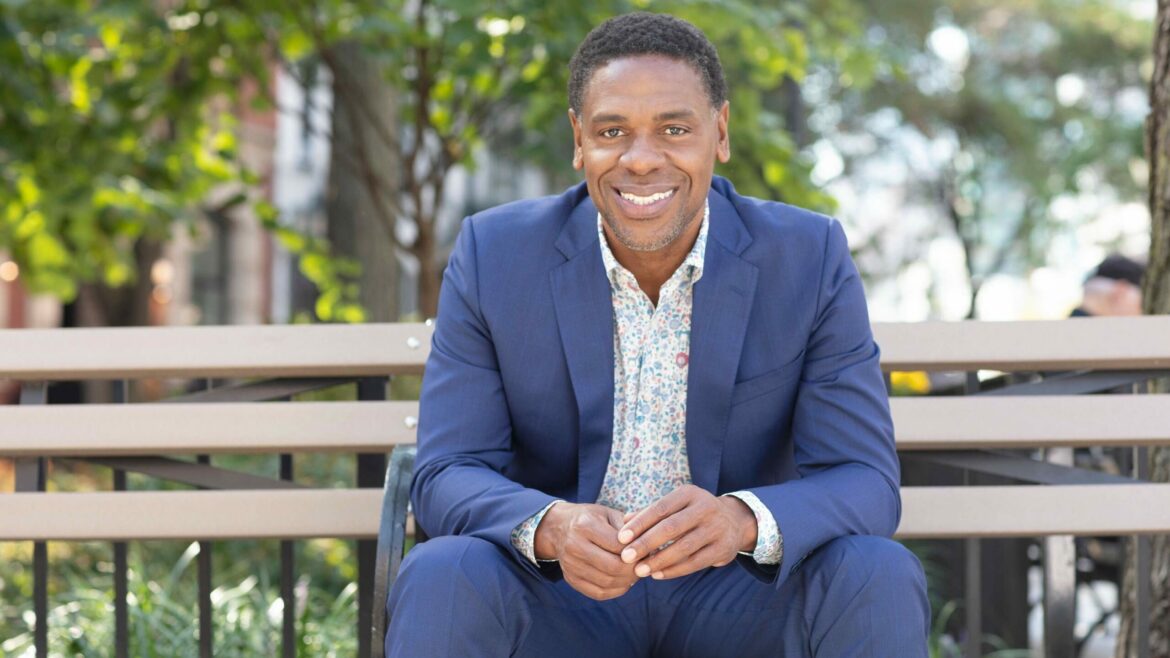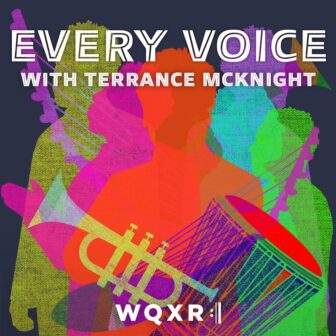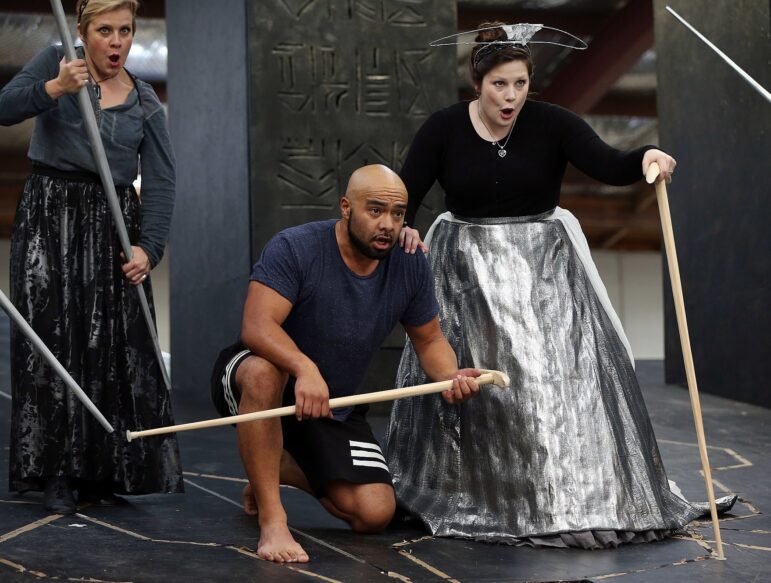With ‘Every Voice’ podcast, Terrance McKnight explores racism in classical music

WQXR
McKnight
For centuries now, Mozart’s The Magic Flute has been held up as one of the greatest operas ever written. Countless companies around the world have performed it for hundreds of years, and millions of theatergoers — including groups of schoolchildren — have trundled through concert halls where it’s performed in search of some musical enlightenment. And yet, as classical musician, writer and scholar Terrance McKnight points out in his new podcast for WQXR, it has inherently racist themes and characters that have gone largely unchecked.
With Every Voice, his new venture for New York Public Radio’s classical station, McKnight aims to have a frank discussion about race and classical music. His ultimate goal is to make the scene more beautiful for everyone.
When McKnight first conceived Every Voice a few years ago, he had been at WQXR for more than a decade. He’d produced numerous documentaries about music in the lives of prominent cultural figures like Langston Hughes and Martin Luther King Jr. But the music featured in those pieces wasn’t part of the classical genres that WQXR broadcasts. “The stories were great stories,” says McKnight, “but we wanted to create a venue to have conversations that weren’t necessarily about Western European classical music, primarily. Podcasts were the way to do it.”
Around that same time, McKnight received a letter from a listener who, as he says, told him “‘to go back where I came from’ and take [composer] William Grant Still and Duke Ellington with me.” That listener, McKnight says, thought that his culture was superior to McKnight’s, though as McKnight jokes, “I’m from Cleveland, so I thought, ‘Go back to Cleveland?’”
Shannon Connelly, a station VP at the time, took the letter seriously. She teamed with McKnight to make sure that WQXR wasn’t the kind of station to which listeners would feel comfortable sending racist hate mail. WQXR didn’t respond directly to the listener, but the team began bumping up the representation of women and composers of color in its programming, he says. And it gave McKnight the green light to craft a podcast that explored deeper issues of race and culture in the classical space. WQXR staff also started brainstorming ways to make sure whatever McKnight produced would get the attention it deserved.
Need for ‘a different lens’
To shine a spotlight on Every Voice, WQXR decided to produce it first as a podcast, says CCO Ed Yim. That would allow the show to reach new listeners far beyond New York City.
“We’re very committed to our local terrestrial community in the greater New York area that our broadcast signal reaches,” says Yim. “But more and more young people are used to consuming things on demand and not making an appointment to hear a show at a certain time of day on a certain night of the week.”

“We are seeking a more diverse audience for what we do, as well as a younger audience, and terrestrial radio is maybe not where they gather,” Yim adds.
“Classical music has been predominantly thought of as a Western European white male domain,” Yim says. “All the icons of what we think of as classical music fit into that category, plus maybe a couple of guys from Russia and maybe one or two women. We need to look at it through a different lens. Every Voice helps us open up the idea of what classical music can be and what it can mean to more people.”
After committing to Every Voice as a podcast, WQXR built a team and support for McKnight to launch it successfully. The show team is almost entirely people of color, including researchers from different backgrounds and different countries. The teams he’d worked with on his documentaries supported the stories that he wanted to tell, McKnight says, but he didn’t “have a support system or a team that I felt comfortable telling these stories with.” For Every Voice, he worked with producers and people from the podcast world. But he also hired a student from Oberlin College who had contacted McKnight about working together on future projects, for example, and a recent Morehouse graduate who’d sung in the college’s glee club, just like McKnight. “We put this thing together,” McKnight says, “and it was just the right team at the right time.”
“As an organization,” Yim says, “we want to be an increasingly inclusive place with a lot of different perspectives both talking about and producing content. If the people doing the creative work are not bringing diverse perspectives to the table, then how do you reach a more diverse audience? The more perspectives you have around the table, the greater resonance you’re going to have with the audience that you’re trying to seek.”
Bringing the past into the present
McKnight decided to focus early episodes of Every Voice on musical works that allowed him to highlight the prominence of Black-coded slave characters. In The Magic Flute, for example, Monostatos is described as a Moor who’s not to be trusted. Played for centuries by performers in blackface, Monostatos is caricatured in racist stereotypes. He is incapable of being genuinely loved or finding true connection with anyone. He lusts after the opera’s milky-white heroine, Pamina, but the nature of his desire is depicted with scorn. In his big comedic aria, “Alles fuhlt der Liebe Freuden,” Monostatos laments his lack of love, singing in German, “Everything feels love’s joys … yet I must shun love because a black man is ugly. … White is beautiful.”

McKnight started thinking about The Magic Flute while working on his book Concert Black, which looks at Black performers and composers in classical music. “Embedded into the music and particularly into opera was this idea of white superiority and black inferiority, too,” he says. “I thought about all the people and all the kids who have seen The Magic Flute in all sorts of languages, all hearing that kind of rhetoric since 1791.” Opera’s popularity informed minstrelsy, too, as well as how white actors and patrons came to view what it meant to be Black. The Magic Flute might be over 200 years old, but that doesn’t mean its tentacles don’t reach into popular culture even now.
Every Voice aims, as McKnight said on the podcast’s third episode, to “bring the past into the present and the stage into the streets where we all work, live and love together.” If classical audiences of today can learn to think critically about Monostatos and similar characters in Verdi’s Otello and Mozart’s The Abduction From the Seraglio, McKnight hopes they will come to “think more empathetically about how we can treat some of these issues” — as well as how it feels to be a person of color working on and performing these pieces.
“We have to shine a light on these things to really make a difference,” McKnight says. “If people are aware of how that kind of material makes someone feel, maybe there will be some empathy around it, and maybe there will be some conversations.”
WQXR certainly hopes so.
“The core demographic of those who listen to classical music radio is older and whiter than the community that we are trying to serve, and we are trying to make efforts to change that,” says Yim. “If we’re reaching a younger audience, we are by definition reaching a more diverse audience. We don’t want to just preach to the choir, though we do think these are important stories for traditionalists to hear as well.”
‘I have an affinity for octogenarians’
While it’s still early in Every Voice’s season one run, Yim says the station has been encouraged by the response. “We have exceeded our goals, and we’re very encouraged in terms of downloads per episode,” he says.
“The responses that I’ve been most moved by are the ones from people who don’t listen to classical music or who thought that there was nothing in opera that related to them or that would resonate with them,” McKnight says. “I’m hearing from people who have no affinity for that art form expressing excitement about what I’m talking about and hearing themselves in the stories that I’m telling.”
“We really have been very deliberate about wanting to create content that, even if someone is very knowledgeable about classical music, there’s something to discover and something to learn,” says Yim. “At the same time, we want it to be a very welcoming and inclusive place for someone who is new to classical music. It has to work on both levels.”
Later in the season, Yim plans to investigate just who’s listening, too, not just by tracking data and downloads. The podcast will ask listeners to complete a survey that will request some demographic data.
The station is in it for the long haul, too: WQXR has committed to putting what Yim describes as “the muscle of New York Public Radio’s marketing, audience, communications and digital teams” around Every Voice — for its 16-episode debut season and a second season that’s already being planned. “These podcasts need space, grace and room to find their voice and their audience,” he says. “I want to give Terrance and his team — and this content — the space and the runway they need. We’ve set aside resources to find an audience, to maintain it, and to give the show the most opportunity to reach as many people as possible.”
Though the idea isn’t 100% locked down yet, McKnight says he’d like to interview “elder statesmen” of Black classical music for the second season, to be titled “Ladies and Gentlemen.”
“I have an affinity for octogenarians,” McKnight explains, “I want to go around the country and … tell their stories.” His list of interviewees includes T.J. Anderson, a 94-year-old who was the first Black composer in residence at an American orchestra, as well as Joyce Finch Johnson, who plays the organ at Spelman College. “She’s sharp, and she still plays wonderful organ,” says McKnight. “The story she could tell about the people that she’s touched … really documents a rich part of our history.”





